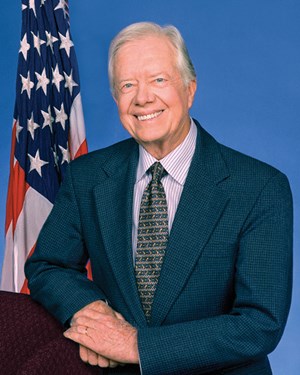Beware of calls for a national “energy policy”
I began what was to become a long career in the U.S. oil and natural gas industry in June 1979, just 10 months before then-President Jimmy Carter (Fig. 1) signed the infamous Crude Oil Windfall Profit Tax (WPT) Act into law. I had landed a job as an accountant with Oscar Wyatt’s Coastal States Oil & Gas Corporation, and was initially assigned the job of filing the company’s severance tax reports for Texas and several other states. Life was generally as good as it could be for a country boy from Beeville, Texas, who was trying to adjust to life in the big city of Houston while earning the-then princely salary of $1,200/month.

But then, the requirements of the WPT came along, and management in our accounting department realized that they had to assign compliance with this burdensome new law to some poor sap. So they asked for volunteers in a team meeting one Tuesday afternoon and, seeing no one else jumping up and down to take on the task, I stupidly raised my hand, beginning a recurring pattern in my career, in which I found ways to advance up the chain by being willing to take on unpleasant tasks that nobody else wanted to do. (It’s a tough way to get ahead, but surprisingly effective.)
Thus, for the first six years of my career, during which I spent time at three different companies, I became something of an expert on what was at the time—and likely remains to this day—the single-most lame-brained “energy policy” ever enacted by the federal government on the U.S. oil and gas industry. The WPT was sold by Mr. Carter and supporting members of Congress as a way to punish “Big Oil” and the “obscene profits” that companies like Exxon, Mobil, Chevron, Texaco, Shell, BP and other majors were supposedly making, as the price of oil approached $40/bbl after two OPEC-created oil shocks of the 1970s. However, the WPT turned out to be neither a tax on profits, nor a tax that actually was collected in any meaningful way from “Big Oil.”
I made a quick discovery, as I began to wade through the morass of regulations, certifications and filing requirements attached to the law. Thanks to some terrific lobbying by “Big Oil” as the legislation had made its way through the congressional sausage-making process, the WPT, in fact, impacted small independent producers, and even royalty owners, far more significantly than it would ever impact any large, integrated oil company.
True story: In 1984, I went to work for a large company headquartered in San Antonio, and was immediately assigned the task of completing the annual WPT Reconciliation filings that had been required under the law since 1980, but which this particular company had never filed. The IRS had recently discovered this failure to file, and had assigned a resident auditor to this company’s offices just before I arrived. So, my job was to placate this auditor—who told me, the first time I met him, that he figured this company owed the government more than $10 million—and get the company’s filings for the previous four years completed.
One Friday, about six months later, we filed our final WPT reconciliation and notified the auditor that the government, due to the somewhat irrational (possibly insane) way that the law was structured, actually owed this company about $6 million in refunds. The following Monday, he didn’t show up, and that afternoon my boss got a call from the IRS office in Washington, notifying us that the agency was terminating its audit residency, effective immediately.
Because of the idiotic way that the WPT was structured (and I won’t go into the details, because I could consume this entire piece if I did so), the law actually stopped generating any revenue at all to the federal government by the mid-1980s. Conservatives like to complain that it is impossible to repeal a tax, once the federal government has implemented it. Well, it turns out that is only true, so long as the tax is actually generating money for the politicians in Washington to spend.

In 1988, after a few years of generating $0 in revenues, then-President Ronald Reagan convinced Congress to repeal this heinous law. And thus ended my first exposure to federal “energy policy,” an exposure that has been a constant part of my 36-year career in the oil and
gas industry.
ENERGY POLICY = PICKING WINNERS AND LOSERS
If you pay attention to energy-related news, you see, and hear, lots of people complaining about this country’s supposed lack of a federal “energy policy” on a daily basis. A great example of this phenomenon is Elon Musk, founder of Tesla Motors, Solar City Corp. and SpaceX, Fig. 2. On May 31, the Los Angeles Times published an investigative piece that detailed how skillfully Mr. Musk has influenced federal and state “energy policy,” and profited handsomely by doing so.
To quote The Times:
“Tesla Motors Inc., SolarCity Corp. and Space Exploration Technologies Corp., known as SpaceX, together have benefited from an estimated $4.9 billion in government support, according to data compiled by The Times. The figure underscores a common theme running through his emerging empire: a public-private financing model, underpinning long-shot start-ups.”
That’s great work if you can get it, but it doesn’t exactly serve as an example of smart energy policy, especially since Tesla, after years now of being propped up by the federal government, still somehow manages to continue reporting operating losses each quarter. One can only wonder what might happen to these heavily subsidized enterprises, should Congress suddenly turn off the spigot. After all, history has shown us repeatedly that what “energy policy” gives, it can take away at a moment’s notice.
THE TRAGEDY OF CORN ETHANOL

Then there is the tragic case of federal “energy policy” surrounding corn ethanol. Lobbyists for this fuel—most notably the gargantuan Archer Daniels Midland Corporation—have succeeded in convincing the federal government to adopt policies that not only subsidize the making of the fuel, but also heavy-handed EPA regulations. These regulations require refiners to add ethanol to the various blends of gasoline that they create, under the guise of reducing atmospheric ozone.
Without these subsidies and regulations, corn ethanol simply would not exist. Corn is probably the least-efficient grain to use to convert into fuel, often requiring as much or more energy usage to create, as it actually produces. Yet, the ethanol lobby has succeeded in creating and perpetuating a self-serving “energy policy,” due largely to the reality that lots of this corn happens to be grown in Iowa (Fig. 3), and the Iowa Caucuses are the first contest in the process of electing presidents every four years. Thus, Democrats and Republicans, alike, are heavily incentivized, themselves, to always express their undying love for corn ethanol.
This federal “energy policy” has completely distorted the market for corn and many other crops, as millions of acres of land formerly used to produce wheat, rice and other crops have been converted to corn, by farmers who smartly want to collect the federal subsidies. This has resulted (very predictably) in higher grocery prices on a wide variety of foodstuffs. The use of so much corn in the making of a fake fuel also has resulted in shortages that have caused hunger in Third World countries, which are heavily dependent on U.S. exports to feed their populations.

When one adds to all of that, the reality that there are plenty of alternatives to corn ethanol as a means of reducing ozone, one comes to the obvious conclusion that this is a tragic national “energy policy” that the country—and the world—could do better without.
CRUDE OIL EXPORTS
One of the current, ongoing debates related to federal “energy policy” is whether or not to repeal an antiquated law that bans the export of crude oil that is produced in the U.S., Fig. 4. We see lots of people trying to blame this particular bad policy choice on former President Carter, but he is not the culprit in this case.
That dubious honor, in fact, goes to former President Richard Nixon, who initially issued an executive order banning crude exports in 1974, in the wake of the first Arab oil embargo that had caused U.S. gasoline prices to double. Mr. Nixon was, in fact, responsible for a whole rash of horrific “energy policies,” as he flailed about in response to OPEC’s actions during the early 1970s. Fortunately for the country, all except this weird, illogical prohibition on oil exports have been unwound over the years. But this one remains, and it is proving a very hard one to undo, as it has become tied up not only in energy politics, but in environmentalist politics, as well.
Where energy politics are concerned, the effort to repeal this law runs into the following concerns:
- Should we really begin exporting crude oil, when we are still importing about a third of our daily oil usage from other countries; and
- Will opening up crude exports result in a rise of gasoline prices at the pump?
That second concern is critical, because members of Congress, and key personnel in the Obama administration, are loathe to enact a policy—or in this case, repeal one—that voters then blame for causing them to have to spend more of their hard-earned money to fill up their gasoline tanks. None of the experts, who have studied the issue, believe that allowing exports of crude would impact the price at the pump in any real way. Yet, the existence of a series of studies demonstrating this provides precious little comfort to politicians, who must run for re-election in 2016 and beyond.
Another energy-related concern mitigating against the repeal of this ban comes from the nation’s independent refiners, i.e., refining companies that are not a part of integrated companies like Exxon Mobil, Shell and BP. These companies, who enjoy no similar federal restrictions on the export of the refined products they produce, oppose the export of crude, since it might deprive them of domestic feedstock that they can obtain at depressed prices, because it lacks access to international markets.
But at the same time, thanks to the boom in the Eagle Ford shale and the Permian basin, there is so much new light, sweet crude coming onto the domestic market, that it threatens to overrun the capacity of U.S. refiners to handle it all. The first time there is a load of sweet crude that can’t find a home at a domestic refinery, the price for U.S. crude will become even further depressed, when compared to the international market. That may be good for independent refiners, but it isn’t good for anyone else.
And of course, the radical “environmental” community has gotten into the debate, as they do on any issue that they see as a possible tool for depressing domestic oil production. Groups like the Sierra Club, Earthworks and the Natural Resources Defense Council have watched in abject horror, as the shale boom has dramatically increased our domestic oil production and reduced foreign imports from 65% of our daily use to about 30% in the last six years. They obviously are anxious to latch onto any issue that would reverse that trend.
It is doubtful that anyone in leadership, in the environmental community, was even aware of this ban until it began to surface as an issue about 18 months ago. However, they now treat it as if it were some sort of Holy Grail of sensible “energy policy.” This opposition from the left-wing environmental community makes it more difficult for many congressional Democrats—even some from Texas—to support the repeal of this ban.
So, we have the spectacle of this clearly archaic, counterproductive “energy policy,” enacted when yours truly was in high school, still clinging to life more than 40 years later, thanks to a confluence of special interests. Their real motivation is to keep the federal government in the business of artificially picking winners and losers, and distorting the marketplace on their behalf.
And that, friends, is exactly what most advocates for a “national energy policy” really have at the top of their respective agendas.
THE “ENERGY POLICY” WE ALREADY HAVE
The truth is that this country already has a national “energy policy” in place. It is a fluid, disjointed, often counterproductive mess, but the policy is there. Since so much of it exists in the form of regulations governed by federal agencies like the EPA, the Department of Energy and the Department of the Interior, the national “energy policy” tends to ebb and flow, as presidential administrations come and go.
One outcome of our national “energy policy” in recent years is that this nation is extremely fortunate, that the vast majority of shale oil and gas plays happen to lie beneath private and state lands, which are regulated mainly at the state level. President Obama likes to brag occasionally about the fact that the shale boom has taken place during his watch, but the reality is that his administration has been focused heavily on restricting and diminishing the ability to search for, and produce, oil and natural gas on federal lands. If most shale resources happened to lie beneath federal lands, President Obama’s national “energy policy” would have ensured that no boom would have ever taken place, and we would likely still be importing 60% of our daily oil needs from countries that are hostile to this nation’s interests.
Another major part of our national “energy policy” lies in our national tax code, which can heavily influence the national fuel mix, even to the point of picking winners and losers. The Obama administration, influenced by the radical environmental lobby, has used the tax code to heavily subsidize the wind and solar industries, to try to make them competitive with coal and gas in the power production sector of the economy. This aspect of our national “energy policy” has had decidedly mixed results, and resulted in a series of embarrassing incidents, such as the bankruptcy of Solyndra, which had received over a half-billion dollars in federal subsidies.
AND IN THE END…
At the end of the day, we should be very careful what we ask for, when it comes to national “energy policy,” and pay close attention to what other, more public figures really mean when they advocate for this elusive animal. Because, more often than not, what they are really after is the ability to take your tax dollars and use them to artificially make their preferred energy source a “winner” in a marketplace, in which it otherwise cannot compete. ![]()
- What's new in production (February 2024)
- Prices and governmental policies combine to stymie Canadian upstream growth (February 2024)
- U.S. operators reduce activity as crude prices plunge (February 2024)
- U.S. producing gas wells increase despite low prices (February 2024)
- U.S. drilling: More of the same expected (February 2024)
- U.S. oil and natural gas production hits record highs (February 2024)
- Applying ultra-deep LWD resistivity technology successfully in a SAGD operation (May 2019)
- Adoption of wireless intelligent completions advances (May 2019)
- Majors double down as takeaway crunch eases (April 2019)
- What’s new in well logging and formation evaluation (April 2019)
- Qualification of a 20,000-psi subsea BOP: A collaborative approach (February 2019)
- ConocoPhillips’ Greg Leveille sees rapid trajectory of technical advancement continuing (February 2019)


